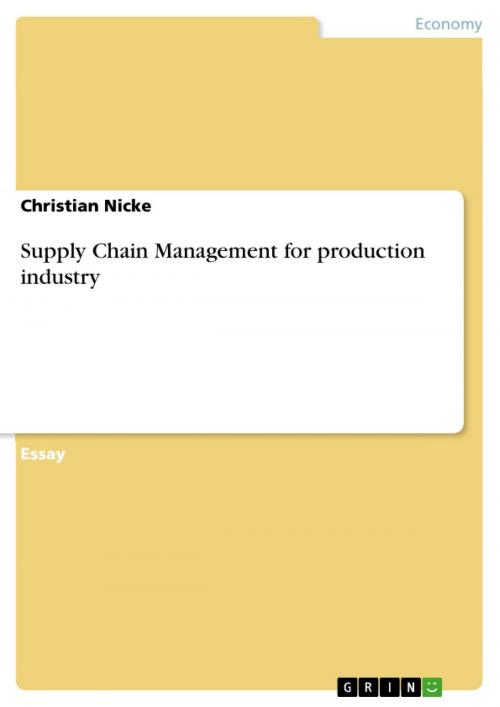Supply Chain Management for production industry
Business & Finance, Management & Leadership, Production & Operations Management| Author: | Christian Nicke | ISBN: | 9783638589253 |
| Publisher: | GRIN Publishing | Publication: | January 7, 2007 |
| Imprint: | GRIN Publishing | Language: | English |
| Author: | Christian Nicke |
| ISBN: | 9783638589253 |
| Publisher: | GRIN Publishing |
| Publication: | January 7, 2007 |
| Imprint: | GRIN Publishing |
| Language: | English |
Essay from the year 2006 in the subject Business economics - Supply, Production, Logistics, grade: 5,0 (excellent), University of Pécs (Faculty of Business and Economics), 14 entries in the bibliography, language: English, abstract: Each business or organization is involved in a supply chain - it is hard to imagine any process in production or service providing that is not affected by a supply chain. Supply chains must be managed to coordinate the inputs with the outputs in a company to achieve the appropriate competitive priorities of the firm's enterprise process. To reach this strategic goal, SCM controls and optimises the key processes that are involved in the value-adding process. Parts of the process are all activities, that are involved in material or information flow. In this context, the management has to decide about several circumstances, where current practice should be critical proved: kind, place and capacity of buffer storage species, number and capacity of means of transport production logistics' general principles identification and enhancement of interfaces between involved companies determination of production- and transportation lot size in the face of logistics way of organisation of logistic-oriented positions in the firm9
Essay from the year 2006 in the subject Business economics - Supply, Production, Logistics, grade: 5,0 (excellent), University of Pécs (Faculty of Business and Economics), 14 entries in the bibliography, language: English, abstract: Each business or organization is involved in a supply chain - it is hard to imagine any process in production or service providing that is not affected by a supply chain. Supply chains must be managed to coordinate the inputs with the outputs in a company to achieve the appropriate competitive priorities of the firm's enterprise process. To reach this strategic goal, SCM controls and optimises the key processes that are involved in the value-adding process. Parts of the process are all activities, that are involved in material or information flow. In this context, the management has to decide about several circumstances, where current practice should be critical proved: kind, place and capacity of buffer storage species, number and capacity of means of transport production logistics' general principles identification and enhancement of interfaces between involved companies determination of production- and transportation lot size in the face of logistics way of organisation of logistic-oriented positions in the firm9















